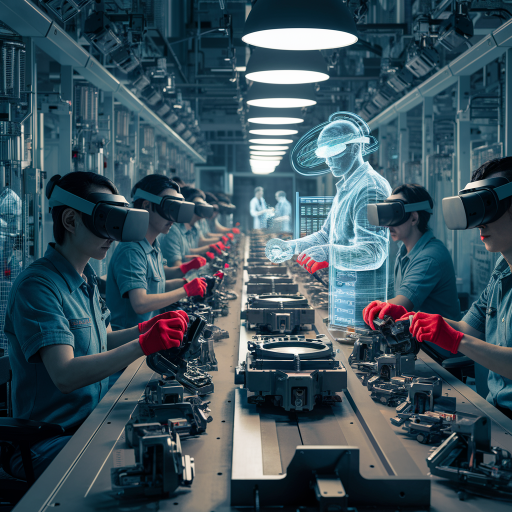In the ever-evolving landscape of manufacturing, companies are constantly seeking innovative ways to enhance productivity, efficiency, and safety. One such groundbreaking solution is Virtual Reality training. By immersing employees in realistic, simulated environments, VR training offers unparalleled opportunities for skill development and safety training. Let’s explore how VR training is transforming the manufacturing industry.

Types of VR Training in Manufacturing
1. Safety Training
VR can simulate hazardous scenarios, allowing workers to practice safety protocols without real-world risks. This includes handling machinery, working in high-risk areas, and responding to emergencies. Employees can repeatedly practice their responses to potential accidents, ensuring they are well-prepared for any situation.
2. Equipment Handling:
Training employees on complex machinery can be costly and time-consuming. VR offers a cost-effective solution by providing hands-on experience with virtual models of equipment. Trainees can interact with detailed virtual replicas of machinery, learning operational procedures, troubleshooting, and maintenance without the risk of damaging expensive equipment.
3. Assembly Line Training:
VR can replicate assembly line processes, enabling workers to understand and master their roles before stepping onto the actual floor. This includes learning the sequence of operations, identifying potential bottlenecks, and practicing time management to optimize productivity.
4. Maintenance Training:
Technicians can learn to diagnose and repair machinery in a virtual environment, reducing downtime and improving efficiency. VR training can cover routine maintenance tasks, emergency repairs, and advanced diagnostics, ensuring technicians are well-equipped to handle any issue that arises.
Benefits of VR Training in Manufacturing
Enhanced Safety
VR training reduces workplace accidents by allowing employees to practice in a risk-free environment.
Cost-Effective:
It minimizes the need for physical resources and equipment for training purposes.
Improved Retention:
Interactive and immersive training experiences lead to better retention and understanding of skills.
Scalability:
Training solutions can be easily scaled and customized to suit the needs of different employees and departments.
Conclusion
The integration of VR training in manufacturing is revolutionizing the industry by providing a safe, efficient, and cost-effective method for training employees. As the technology continues to evolve, the possibilities for VR training are limitless. For any VR training solutions, contact DevDen, a leading VR development company, and unlock the full potential of your workforce with VR manufacturing training.



